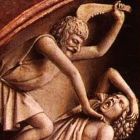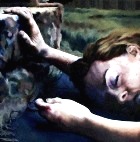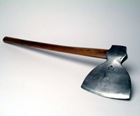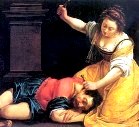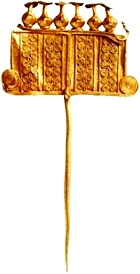Cain kills Abel

This story of Abel’s murder is about:
- fierce rivalry between two brothers, and
- the struggle between two ways of life: nomadic sheep/goat herding, and farming.
- Abel represents the herdsmen, Cain the farmers.
What’s the story really about?
At the time the story of Cain and Abel developed, there was constant friction between farmers and herdsmen, both of them fighting for the limited resources of the land.
 The herdsmen were angry when the farmers took over the best land for their crops
The herdsmen were angry when the farmers took over the best land for their crops- the farmers were angry when the flocks trampled their crops.
This friction led to violence in which people were killed. Notice that the story was developed by the herdsmen, the keepers of flocks.
This explains why Abel, the herdsman, is portrayed as the injured party.
The Bible text
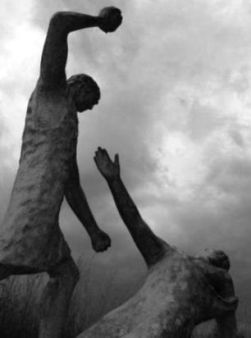
Modern sculpture of Cain murdering Abel his brother
‘Now Abel was a keeper of sheep, and Cain a tiller of the ground. In the course of time Cain brought to the Lord an offering of the fruit of the ground, and Abel for his part brought of the firstlings of his flock, their fat portions. And the Lord had regard for Abel and his offering, but for Cain and his offering he had no regards. So Cain was very angry, and his countenance fell…. Cain said to his brother Abel “Let us go out to the field.” And when they were in the field, Cain rose up against his brother Abel and killed him.”‘ (Genesis 4:3-7)
God/good — Devil/evil
As well as this, the story continues the Bible’s exploration of the origin of evil in a world created by a God who is all goodness. (Remember the old word game: write down ‘God’ and ‘Devil’; then put an extra ‘o’ in the middle of ‘God’ and take the ‘d’ off ‘devil’; what do you have?)
Check the web page The Bible as History for more on the story of Cain and Abel.
Herod and John the Baptist
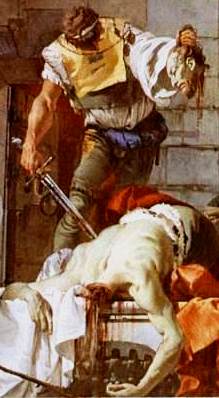
Beheading of John the Baptist, Tiepolo
The political stability of Israel was often upset by people called ‘prophets’. These were social critics who spoke bluntly about injustice when they saw it.
They were a sort of protected species, like a court jester in medieval Europe. They could say something critical to the ruler and get away with it, where no-one else could.
There were many such men in the Old Testament (Elijah springs to mind), and several in the gospels (Jesus and John were both called prophets).
Occasionally they went too far and came a cropper. This is what happened to John.
Why did Herod hate John?
John was highly critical of the ruler of Galilee, Herod Antipas, who had married the divorced wife of his brother. The woman’s name was Herodias, and she had a beautiful daughter Salome.
John spoke out loud and clear against the incest that, according to Jewish law, was being committed by Antipas and Herodias.
It was a dangerous thing to do. He might have got away with it with Antipas, who was indolent and indecisive, but Herodias was another matter. She engineered a situation that led to John’s death, silencing him forever. 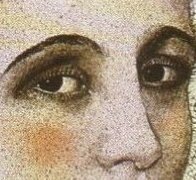
Did Herodias do it alone?
Probably not. It is more likely that all three (Antipas, Herodias and Salome) planned the charade beforehand, to provide an excuse for getting rid of John and silencing him.
In any case John, already in prison, was quickly beheaded. Another political problem was solved.
Were it not for the fact that the gospels recorded this deed, John’s name and the horror of his death would have been lost forever.
See Rita Hayworth in the Dance of the 7 Veils
Pogrom: Pharaoh kills babies
The Israelites flourished in Egypt:
- they were hard-working
- they had a good diet and strict purity laws
- they were clean and healthy.
This meant a good survival rate for their children.
But too many foreign workers can pose a threat. Pharaoh certainly thought so. ‘The Egyptians came to dread the Israelites.’ (Exodus 1:12)
The problem was made worse by the fact that the Israelites occupied border territory. If there was an invasion, they might defect to the enemy. This could mean the collapse of the Egyptian Empire.
Who were Shiprah & Puah?
Pharaoh did not want to eject them from Egypt – they were too valuable as workers. So he sought to control their numbers by forced labour and by child slaughter.
He told the midwives that every male baby must be killed as soon as it was born.
This plan was thwarted by the Hebrew midwives, including Shiprah and Puah. So Pharaoh ordered instead that every newborn Israelite boy was to be hurled into the Nile waters and left to drown.
Over the years, this must have happened to many thousands of newborn Israelite boys.
The Bible Text
15 Then the king of Egypt said to the Hebrew midwives, one of whom was named Shiph’rah and the other Pu’ah, 16 “When you serve as midwife to the Hebrew women, and see them upon the birthstool, if it is a son, you shall kill him; but if it is a daughter, she shall live.”
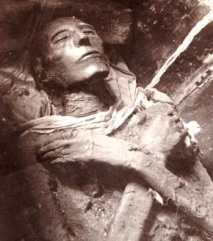
The mummified corpse of Sethos I, who may be the Pharaoh who ordered the murder of Israelite babies
17 But the midwives feared God, and did not do as the king of Egypt commanded them, but let the male children live. 18 So the king of Egypt called the midwives, and said to them, “Why have you done this, and let the male children live?” 19 The midwives said to Pharaoh, “Because the Hebrew women are not like the Egyptian women; for they are vigorous and are delivered before the midwife comes to them.”
20 So God dealt well with the midwives; and the people multiplied and grew very strong. 21 And because the midwives feared God he gave them families.
22 Then Pharaoh commanded all his people, “Every son that is born to the Hebrews you shall cast into the Nile, but you shall let every daughter live.” Exodus 1:15-22
Judith and Holofernes
Judith was a rich and beautiful widow who lived in a town besieged by Nebuchadnezzar’s general, Ho lofernes.
lofernes.
The siege went on for months, and people were dying of hunger and thirst.
This was when Judith went into action. She went into the enemy camp and offered Holofernes information that would help him defeat her own people.
He may or may not have believed her, but her beauty made her a sexual fly-trap, and he allowed her to stay.
In the ensuring battle of wits, Judith managed to out-strategize her prey. While he was drunk, she pulled his sword out of its scabbard, prayed to God for strength, hacked Holofernes’ head off, then escaped back to her people.
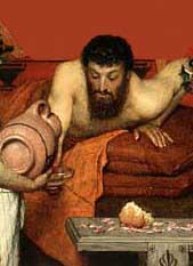 When the murder was discovered the enemy soldiers fled in panic, so Judith was proclaimed the savior of her people.
When the murder was discovered the enemy soldiers fled in panic, so Judith was proclaimed the savior of her people.
The Bible text
‘She went to the bedpost near Holofernes’ head, and took down his sword that hung there. She came close to his bed, took hold of the hair of his head, and said “Give me strength today, O Lord God of Israel!” Then she struck his neck twice with all her might, and cut off his head.
Next she rolled his body off the bed and pulled down the canopy from the posts. Soon afterward she went out and gave Holofernes’ head to her maid, who placed it in her food bag.’ Judith 13:6-10
For Judith’s story, see Bible people: Judith and also Judith & Holofernes: famous paintings of the murder
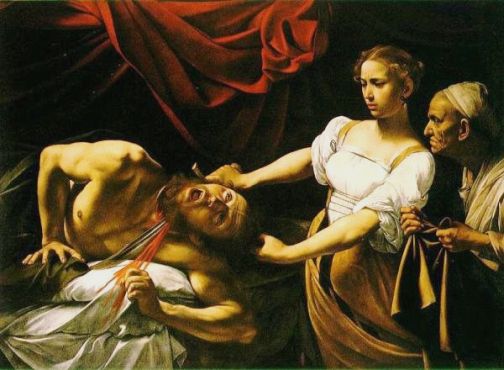
Caravaggio’s graphic painting of the moment when Judith hacks off the head of Holofernes; notice her maidservant waiting grimly in the background
Jehu murders Jezebel
Jezebel was the powerful queen of Israel during the reign of King Ahab. When her husband was killed in battle, the throne passed to Ahab’s son Ahaziah.
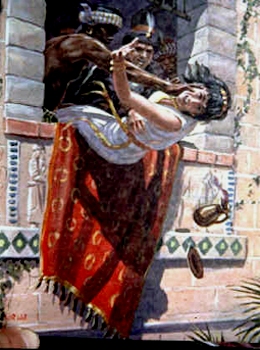
Jezebel is thrown from the high palace balcony by her eunuchs
Fairly soon, Ahaziah died in an accidental fall through a lattice window in his palace (now that’s hard to believe), and was succeeded by his brother Jehoram.
During this period Jezebel was the powerful Queen Mother, the alpha female of Israel.
Then an army captain called Jehu led a coup d’etat against the royal house of Israel, and killed Jehoram.
Alone, Jezebel faced certain death.
Jehu was merciless, and Jezebel died horribly. She was first thrown from the window of her palace, then trampled to death by chariot horses driven over her still-living body.
Left to rot while Jehu dined, her body was eaten by stray dogs.
The Bible text
‘When Jehu came to Jezreel, Jezebel heard of it; she painted her eyes and adorned her head, and looked out of the window. As Jehu entered the gate, she said “Is it peace, Zimri, murderer of your master?”
He looked up to the window and said “Who is on my side? Who?” Two or three eunuchs looked out at him. He said “Throw her down.” So they threw her down; some of her blood spattered on the wall and on the horses, which trampled on her. Then he went in to dinner. …..
When they went to bury her, they found no more of her than the skull and the feet and the palms of her hands’ (the dogs ate her flesh) (2 Kings 9:31-37)
For more about Jezebel, see Bible people: Jezebel
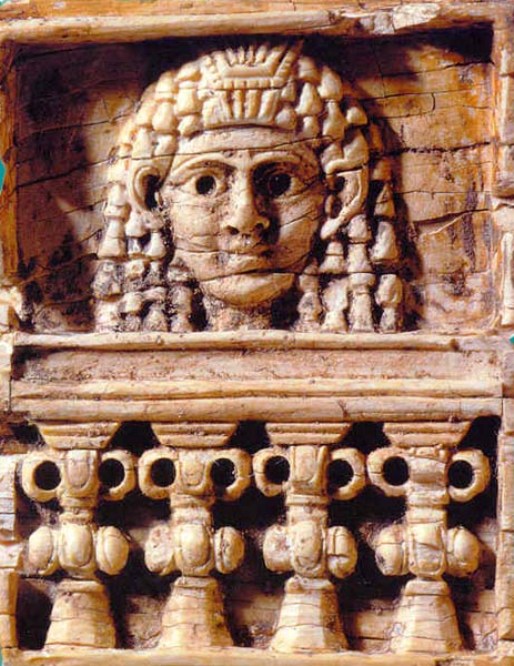
Ivory carving showing the ‘Woman at the Window’, a common image in ancient religions
The death of Absalom
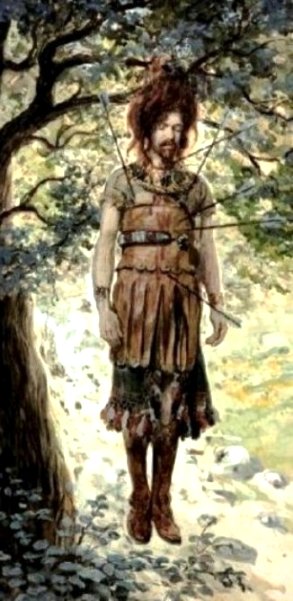
The death of Absalom, painting by James Tissot; Absalom’s body hangs from the tree in which his hair is caught
Absalom’s seething resentment about the rape of his sister Tamar (see Tamar’s story) eventually spills out into open rebellion against his father David, who never punished the rapist.
But Absalom is defeated when he faces his father in battle, which takes place in the forest of Ephraim. Absalom’s untrained militia are at a disadvantage against David’s highly trained mercenaries, and they are cut to pieces.
In the melee, Absalom’s long unbound hair gets caught in the low branches of a tree, and he is left helpless, swinging from the tree.
David’s field commander, Joab, hears of this. He quickly rides to the spot and plunges a spear into Absalom’s heart. Then Joab’s body-guards finish off the job.
The Bible text
‘Absalom was riding on his mule, and the mule went under the thick branches of a great oak. His head caught fast in the oak, and he was left hanging between heaven and earth, while the mule that was under him went on…….
Joab took three spears in his hand, and thrust them into the heart of Absalom, while he was still alive in the oak. And ten young men, Joab’s armor-bearers, surrounded Absalom and struck him, and killed him.’
(2 Samuel 18:9-15)
The Levite’s Concubine
A Levite man and his concubine (a secondary wife without the legal status of a wife) were traveling through the hill country of Judah. The village they entered seemed unfriendly but they were eventually make welcome by an old man, who let them stay in his house.
 During the night they they were attacked by some of the villagers who wanted to rape not the woman, but the man.
During the night they they were attacked by some of the villagers who wanted to rape not the woman, but the man.
The old man who was the Levite’s host offered the men his own daughter instead, as well as the concubine, but the men outside would not listen.
The girl is abandoned by her husband
The Levite then pushed the concubine out the door, giving her to the villagers. They gang-raped and tortured her throughout the night. Finally they left her for dead.
She managed to crawl back to the door of the house where the Levite, the old man and his daughter sheltered. She lay on the doorstep until morning, when the Levite unlocked the door.
Her husband saw her and told her to get up. There was no answer. She was dead.
The story is horrifying. Perhaps worst is the fact that similar stories have recently come out of India and Pakistan. This barbarity continues.
The Bible text
‘In the morning her master got up, opened the doors of the house, and when he went out to go on his way, there was his concubine lying at the door of the house, with her hands on the threshold. ‘Get up’ he said to her, ‘we are going’. But there was no answer.’ (Judges 19:27-28)
Jael and Sisera
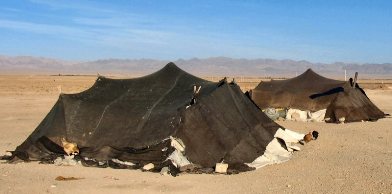
Tents belonging to nomads in the Middle East
Sisera, the defeated enemy general in the story of Deborah & Jael, fled from the scene of battle, abandoning his own soldiers in an effort to save his own skin. See Ancient Warfare
He came to a camp site whose people, he thought, would be friendly to him.
A woman stood at the entrance to one of the tents, and beckoned him in. She seemed to want to help him. He should have been more careful.
She offered the exhausted soldier some milk to drink, then waited for him to fall into exhausted sleep. Then she took a tent peg and a mallet, stepped quietly to his side, knelt down, then swiftly drove the peg through the side of his skull. He died instantly – an ignominious death at the hands of a woman.
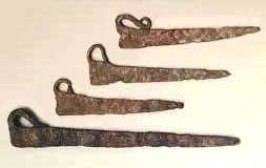
Ancient metal tent pegs,
Jael’s improvised weapon
This woman, called Jael, is praised in poetry and prose as one of the great heroines of the beleaguered Israelites.
The Bible text
(Judges 4 & 5)
‘She put her hand to the tent peg and her right hand to the workmen’s mallet;
she struck Sisera a blow, she crushed his head, she shattered and pierced his temple.
He sank, he fell, he lay still at her feet; at her feet he sank, he fell; where he sank, there he fell dead.’
(Judges 5:26-27)
For more on this story, see Bible Women: Jael & Deborah
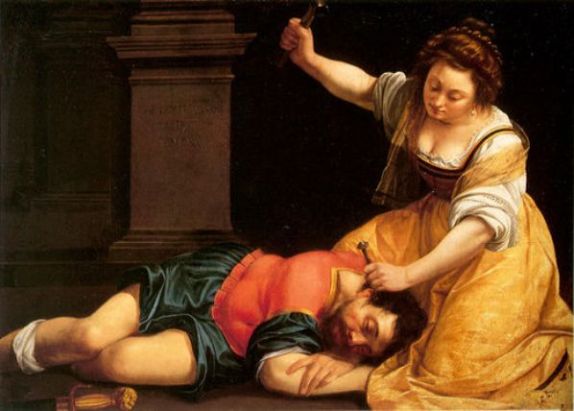
Jael and Sisera, Artemisia Gentileschi Jael prepares to hammer the tent peg into the head of the enemy general Sisera
Ehud assassinates Eglon
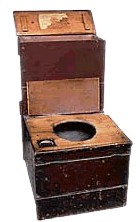 Ehud, an Israelite, reluctantly carried tribute to the hated Moabite king Eglon. He did not want to do it, but he knew he had to – Eglon was like a Mafia chieftain, too powerful and too violent to disobey.
Ehud, an Israelite, reluctantly carried tribute to the hated Moabite king Eglon. He did not want to do it, but he knew he had to – Eglon was like a Mafia chieftain, too powerful and too violent to disobey.
But Ehud had a plan. As he handed the booty over, he whispered to the king that he has secret information that he could only divulge in private. The king, intrigued, invited Ehud into a private room upstairs. It was a tiny room with a commode toilet for the use of the king and his family.
Once inside the room with the door firmly closed, Ehud drew out a sword he has strapped to his inside thigh and plunged it into the king’s very fat body.
How did he get the knife past the guards?
He was left-handed. The guards searched for a weapon on his left thigh where a right-handed person would have hidden it. They missed the knife inside his right thigh.
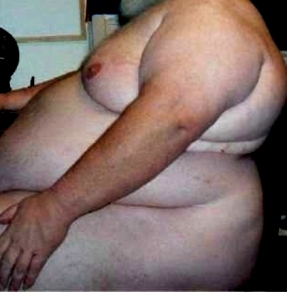 The Bible gives a graphic description of the king’s body. It was so fat that the blade went deep into his belly: it plunged so far in that the hilt went in as well, and the skin closed over it.
The Bible gives a graphic description of the king’s body. It was so fat that the blade went deep into his belly: it plunged so far in that the hilt went in as well, and the skin closed over it.
Ehud’s hand was covered in faeces.
Then Ehud quickly left, locking the door after him so the servants would think the king was taking his time as he relieved himself.
Ehud escaped, and when the servants finally checked on their king he was dead, and very messy.
The Bible text
‘Then Ehud reached with his left hand, took the sword from his right thigh, and thrust it into Eglon’s belly; the hilt also went in after the blade, and the fat closed over the blade, for he did not draw the sword out of his belly; and the faeces came out.
Then Ehud went out into the vestibule and closed the doors of the roof chamber on him, and locked them.’ (Judges 3:21-23)
Jehu slaughters the royal children
After Jehu killed Jezebel, he rounded up all the family, friends and supporters of the royal family and slaughtered them. Male children were included in this mass murder, since they would one day grow up and perhaps seek revenge.
There is something particularly cruel about this slaughter of the innocents. It was done by people the boys had grown to trust, but who now hunted them down and killed them violently.
Their dead bodies, it seems, were too cumbersome to tranport. Instead, the boy’s heads were hacked off, collected in baskets, and displayed for the gawking crowd the the city gate.
This barbarism seem to have been common practice in the ancient Middle East, as the wall relief below shows.
The Bible text
‘Then Jehu wrote them a second letter, saying “If you are on my side, and if you are ready to obey me, take the heads of your master’s sons and come to me at Jezreel tomorrow at this time.”
Now the king’s sons, seventy persons, were with the leaders of the city, who were charged with their upbringing. When the letter reached them, they took the king’s sons and killed them, seventy persons; the put their heads in baskets and sent them to him at Jezreel.
When the messenger came and told him “They have brought the heads of the king’s sons” he Jehu said “Lay them in two heaps at the entrance of the gate”.’
(2 Kings 10:6-8)
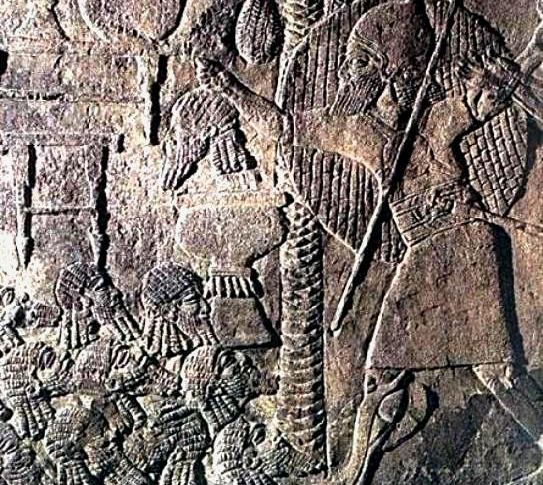
Bible Study: famous murders in the Bible: Cain and Abel, Herod and John the Baptist, the death of Absalom, Judith and Holofernes, Jehu murders Jezebel, the Levite’s concubine, Jael and Sisera, Ehud murders Eglon, Jehu slaughters the royal children
Bible murder links
© Copyright 2006
Elizabeth Fletcher

